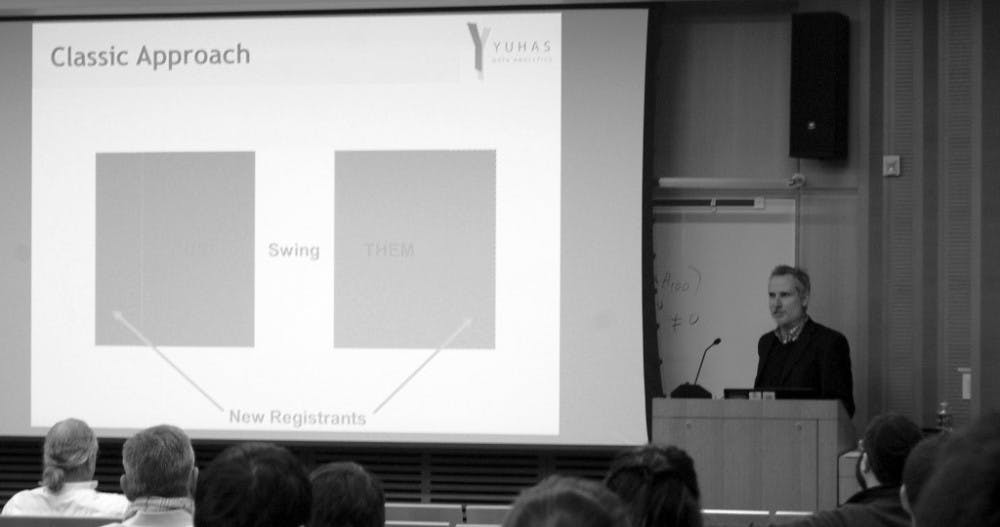Hopkins alumnus Ben Yuhas gave a presentation about political campaign spending in Gilman Hall on Thursday hosted by the Hopkins Undergraduate Society for Applied Mathematics (HUSAM). The talk, Moneyball in Politics, detailed how campaign teams spend money and how they collect and analyze data to spend it wisely.
Yuhas, who received his graduate degree from Hopkins in 1991, currently manages his own consulting firm and worked with Hillary Clinton during her 2008 presidential campaign.
He started his career in business, working in financial services and building economic models that predicted consumer behavior. He realized that similar models could be built to predict voter behavior and he used these models to aid John Kerry’s 2004 presidential campaign.
Yuhas discussed how polling has evolved since the early 2000s.
“The most interesting thing going on in polling is that the channels are deteriorating,” he said. “Largely the data component back then was polling... back then you just randomly dialed phone numbers within your region and got your sample that way.”
Yuhas explained that calling became less necessary following the Help America Vote Act of 2002.
“Once those electronic databases became available immediately commercial enterprises, [said] ‘Well I can take all those voter files and augment them and create tools around them.’ And it opens up the possibility of sort of individual levels of modelling,” he said.
He explained that more advanced models helped politicians with targeting specific likely voters.
“You wasted a lot of time trying to persuade people that were going to vote for you anyways,” Yuhas said. “In 2008, the contacts were very targeted with the highest concentrations among the low turnout [Democrats] and the high turnout moderates.”
Yuhas explained how modern modelling techniques meant that candidates were able to target their audiences more effectively. This meant choosing the audience which would have the biggest impact on voters.
“It’s really just being more efficient with the money you have. It’s trying to figure out: If I have this many dollars to call somebody or reach them, where’s the biggest bang for my buck,” he said.
He went on to talk about how money was being used in the current political campaigns, showing the amount spent by each candidate on advertising and discussing the effectiveness of their advertising campaigns.
Senior Dan Adler who is majoring in applied mathematics described why he came to the talk, speaking about the prevalence of politics in everyday life.
“I’m an applied math major, senior and it’s kind of hard to avoid hearing about politics, especially with the primaries that are taking up every piece of news in February this year,” Adler said. “It’s interesting to hear from someone who’s been doing this for a while, you know how they can best predict this and persuade voters.”
Hopkins alumna Byu Jareonvongrayab also enjoyed the presentation, citing it as useful and informative.
“When I heard about those mobile phones and the fact that you can track and tie it to your other behavior, there is a whole new set of data that I hadn’t thought about yet. The stuff I do now is so primitive compared to what they could do. I mean it’s still pretty powerful,” she said.





